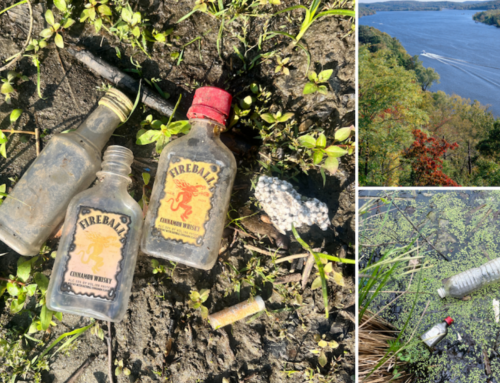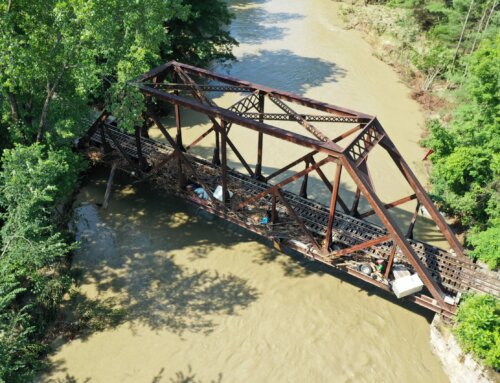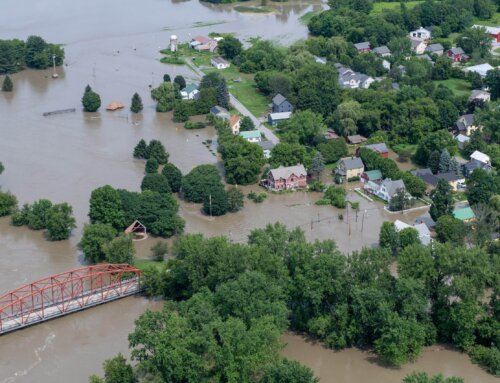SAXTONS RIVER, VERMONT. DECEMBER 18, 2009. According the Connecticut River Watershed Council (CRC), the Vermont Supreme Court upheld a 2008 Environmental Court decision allowing the Entergy Vermont Yankee (ENVY) nuclear power plant to increase the temperature of the Connecticut River. CRC, Deerfield/Millers Trout Unlimited chapter, Citizen Awareness Network, represented by the Environmental and Natural Resources Law Clinic at Vermont Law School, had asked the Supreme Court to overturn the Environmental Court decision based on concerns over the impact of Entergy’s thermal discharge on the river, particularly the impact on American Shad populations.
The Court decision clears the way for ENVY to raise the temperature of its discharge into the Connecticut River during the summer by one degree Fahrenheit. This will allow ENVY to avoid the cost of running its cooling towers, at the expense of the ecological health of the river.
“The Supreme Court declined to overturn the Environmental Court even though the Entergy studies that the Environmental Court relied upon do not address the reasons for the collapse of the shad fishery above Vernon dam” said David Deen river steward for CRC. “We knew we were up against significant odds given ENVY’s resources but we will continue to use what tools and resources we have to ensure the recovery of American Shad and Atlantic Salmon populations in the Connecticut.”
CRC still has significant questions about the soundness of the fisheries science presented by ENVY and will continue to work with the Vermont Agency of Natural Resources to press for independent studies that document fisheries impacts of the thermal discharge.
The Vermont Supreme Court’s decision did decide, over ENVY’s objection, that the Vermont Water Quality Standards do apply to ENVY’s discharge. The company had argued that it was exempt from the standards.
At issue in this case was a permit amendment for a one degree temperature increase. The Agency also has a pending application from ENVY for a complete permit renewal. In the renewal process, the Agency must consider the impacts of the full temperature increase of up to five degrees above the normal temperature of the river. CRC will have the opportunity to appeal the permit on renewal if not satisfied that its terms are sufficient to protect the river.
“This was the first round in what will be an ongoing battle,” said David Mears, Director of Vermont Law School’s Environmental and Natural Resources Law Clinic. “While Entergy has many more resources than our clients, we have learned a great deal from this appeal about what it will take to eventually prevail — we are committed to staying the course to ensure that our clients’ voice on behalf of the river is heard.”
-endit-
Contact: David L. Deen River Steward, River Steward CRC
(802)-869-2792, ddeen@ctriver.org; ctriver.org
David Mears Natural Resources and Environmental Law Center
(802) 831-1627, dmears@vermontlaw.edu
About CRC: For over 50 years, CRC has worked in partnership with people to protect the Connecticut River watershed from source to sea. Accomplishments include helping to restore access to spawning areas for migratory fish, protecting over 8,000 acres through our Land Conservancy Program, and supporting three full-time River Stewards who bring CRC’s on-river presence to every region of the watershed, taking action and assisting community groups. Learn more at ctriver.org.
About Vermont Law School’s Environmental and Natural Resources Law Clinic: The Clinic is intended (1) to provide a high-quality, skills-based educational experience for law students to learn how to become competent, ethical attorneys with expertise in the field of environmental and natural resources law; (2) to provide representation for individuals and organizations who would otherwise not have access to legal services; and (3) to ensure that laws protecting health and the environment are properly interpreted, implemented, and enforced to prevent and abate environmental problems, and to conserve and restore natural resources for the benefit of this and future generations.







